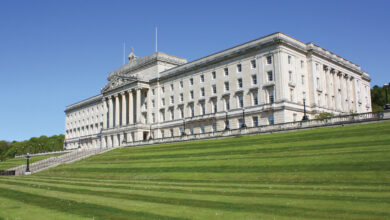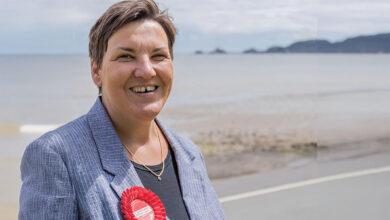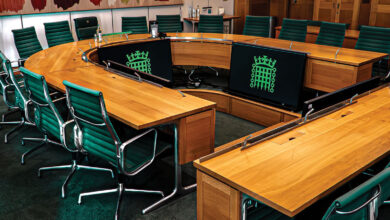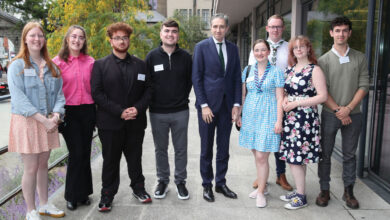Looking north: Micheál Martin, TD
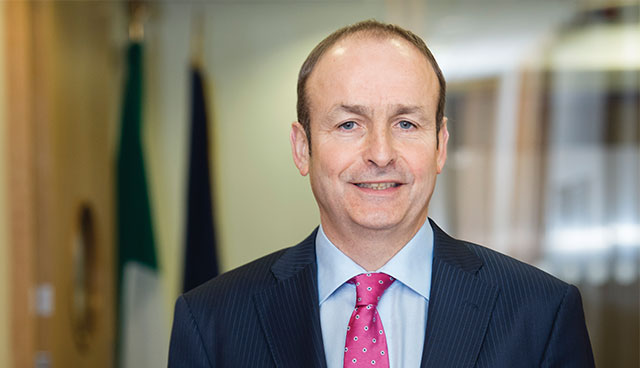

Ciarán Galway speaks with Fianna Fáil leader Micheál Martin ahead of the new Dáil session to unpack the party’s engagement in and perspective on Northern Ireland.
The vista visible from Martin’s office encompasses Leinster Lawn; the focal point of which is a golden flame-tipped obelisk cenotaph, commissioned by party predecessor Éamon de Valera and completed in 1950. Intriguingly, the structure is not a lieu de mémoire for the Soldiers of Destiny. Rather, it bears the names of three icons who personify Fine Gael party mythology: Micheál Ó Coileáin, Art Ó Griobhta and Caoimhghín Ó h-Uigín.
Martin’s line of sight however, despite a fleeting career as a history teacher, is very much set upon the future. Confident and stern, the Cork-man wades into the interview with the deftness of a leader absolutely assured in his determination to restore Ireland’s ‘natural governing party’ to its former glory.
Brexit
On the issue of Brexit, the Fianna Fáil leader is sceptical of the British Government’s coherence in its negotiations. “The general election has thrown up a new dynamic. A lot will depend on the Conservative Party’s internal politics. Then you have the conflicting elements of the Scottish Conservatives, Labour, the Liberal Democrats and moderate Conservatives, who are remainers. All of that is creating a mix which renders it very difficult for Europe to deal with Britain and also for Britain to come out with a coherent voice. That is a big worry for us.”
Post-Brexit, the Fianna Fáil vision for Northern Ireland is a ‘special status’ scenario incorporating a free-trade zone on the island of Ireland and continued access to European programmes, including education and research. “[Irish citizens] should not be denied their entitlements as EU citizens. Essentially you are looking at a unique solution that almost encompasses the dual status of Northern Ireland. There are large urban conurbations in the North which are very disadvantaged and reflect some of the poorest regions in Europe, so I do believe that there is a potential European dimension in terms of socio-economic policy and investment that could help.
“I think there is a general empathy with the North. My worry is that there may be a tendency in Europe to grow tired of the whole Brexit thing and want to get on with other things. There is some evidence of a hardening of positions in Germany and France on some of these issues, so I’d be slightly concerned that the longer it drifts out, things may not work out as well as we might like.”
Executive collapse
Martin feels that his analysis of the collapse of the northern Executive as an electoral ploy has now been vindicated. “It was meant to be about a Renewable Heating Incentive, yet the latest round of talks have moved off this and we’re now dealing with a language as a reason why we can’t bring back the Executive. I worry about the politicisation of the language as a speaker myself and as someone who is committed to the Irish language.
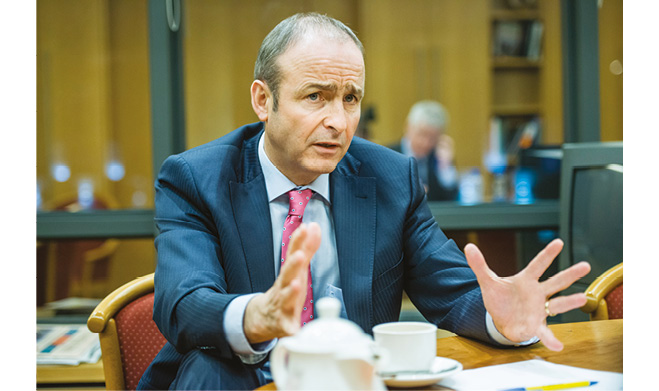
“The most worrying aspect is, prior to the collapse of the Executive, [the parties] were actually developing a degree of coherence on Brexit, a practical one, notwithstanding the DUP being Brexiteers. They were beginning to use the Executive and the North-South Ministerial Council as a vehicle to try to create a coherent viewpoint. They’ve lost that in the last nine months and that’s a great concern.”
Preparing for unity
On the issue of Irish reunification, Martin argues that the Government’s first priority must be to focus on implementing the Good Friday Agreement. “I disagree strongly with Sinn Féin utilising Brexit as a basis for its own electoral mandate to be frank. It’s gone back to base, using Brexit to drive a unity agenda and the two are not related in my view. Certainly not yet. I think it’s creating a wedge with unionism and loyalism. If you were intelligent you would allow things to evolve.”
Dismissing a border poll as majoritarianism by another name, he suggests that such a referendum would have inevitably failed if called in recent years. “There was no blueprint created, no one knew what they meant by a ‘united Ireland’, no one still knows what they mean by a ‘united Ireland’. We support a united Ireland, however a border poll to me isn’t a united Ireland. A border poll is divisive and puts 48 per cent in their box and tells them to lie down.”
“I disagree strongly with Sinn Féin utilising Brexit as a basis for its own electoral mandate to be frank. It’s gone back to base, using Brexit to drive a unity agenda and the two are not related in my view.”
He also contends that the full potential of Strand Two of the Good Friday Agreement has not yet been realised. “Sinn Féin have really not got engaged on north/south [and] the DUP have been very slow on that side of it. Three years ago, I put forward a template for how we could devise new bodies on north/south. For instance, I believe there should be one Enterprise Ireland on the island to promote indigenous enterprise. But what we’re getting now is a hardening or polarisation where it’s a border poll or nothing, where it’s unity or nothing and if you don’t agree then there’s something wrong with you.”
Alluding to the progress being made by Fianna Fáil’s working group on Irish unity (“we hope they will be publishing that maybe towards the end of the year”), Martin is unequivocal: “The Good Friday Agreement is the template, no matter what you have in the future.
“The three-stranded relationships will continue. We’re going to have two parliaments on the island of Ireland, because I think the North, given its evolution, is [a region] where you’re going to need a sharing of power through an Executive and an Assembly. I prefer an evolutionary pathway to building relations on the island of Ireland, because unity is about people, it is not about territory.
Concluding the discussion, Martin summarises his party’s current status: “We’ve made great progress since 2011. We’re on a journey of renewal and recovery. We’re a party that wants to be rooted in every community, to ensure a strong social democratic ethos in terms of fairness and decency, that working people will be looked after, that vulnerable are protected in our society, that there is equality of opportunity and that a true meritocracy exists in our country.” Fianna Fáil’s first quantifiable northern foray will come through its commitment to contest the 2019 local elections.

